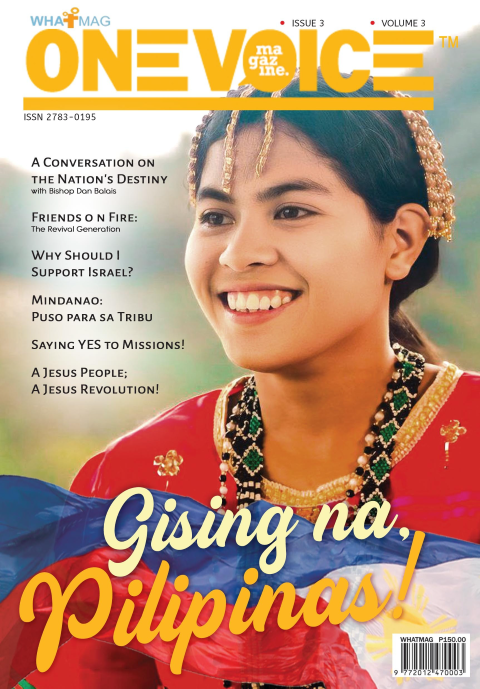DAY1
The One Voice Magazine team rose bright and early to converge at the Civil-Military Operations Regiment (CMOR) Headquarters in Fort Bonifacio, Taguig, at 8 a.m. We were an excited bunch, wide-eyed and animated, our arms carrying sleeping bags and backpacks.
Inside the CMOR lobby, the registration team noted each individual’s requirements, making sure everyone received their kits and turned in a complete set of documents. While this happened, one of the army trucks assigned to us went to pick up the donations for the Pokis, which were kept in a storage area at the Community of Faith Alliance Church in Paranaque City. There were 27 boxes of these donations full of school supplies, clothes, toys, shoes, seeds, and books.
Rain poured heavily from the sky, causing the army truck to be delayed as the soldiers and some volunteers scrambled to secure the boxes with tarpaulin and plastic bags. They needed to make sure these goods would not be spoiled by the rain.
While the One Voice Magazine team waited for the truck to come back to CMOR, we had a special visit from Col. Ronnie Ebarita, a soldier whose help toward One Voice stretched years back when we partnered with the army in relief missions, trauma debriefing, and outreaches in places like Bohol, Tacloban, and Samar. Col Ebarita, fondly called by members of the team as “Papa Bear,” gave an inspirational talk and released the volunteers in prayer.
Afterwards, the team was given a run-through of the day’s events. It was a matter of time before the army truck finally arrived back in CMOR. We left Fort Bonifacio riding two trucks and being escorted by some soldiers.
From city roads full of traffic to clear roads surrounded by green fields and haystacks, the One Voice Magazine team travelled to Tarlac bringing their boxes of donations. We stopped first at the San Clemente Municipal Hall where we were joined by Claudia Toledo, the principal of the school where the Aetas go to. We were also joined by sponsors who had arrived earlier in cars, hundreds of tsinelas in their care. Altogether, we left the cemented roads of the city and travelled up the dirt roads to the Pokis.
Some of the cars had difficulty climbing due to the extremely thick, muddy ground. Occupants of the vehicles transferred to the army trucks, filling every conceivable space. At one point, we all had to go down the trucks to walk the rest of the way. Finally, the whole team reached the tribe.
Soldiers from the 3rd Mechanized Infantry Battalion were already present, having set up two open-sided conference tents, a huge parachute waving in the wind (doubling as a tent), and a sound system. They were pleased with the arrival of the still wide-eyed travellers.
The volunteers had a short time of instruction with our team leader, Janina Rivera. Afterwards, we hurriedly wolfed down a merienda of pancit. The volunteers then separated the tribe into age groups where each group had one or two Bible storytellers from the team. There were different Bible stories shared and various activities implemented for the children, youth, mothers, fathers, and grandfathers. These exercises were conducted so that members of the tribe could deepen their understanding and appreciation of the Bible.
After this, it was a special time of sharing as a community. We formed a wide circle. Chieftain Robert prayed a beautiful prayer in the Pokis dialect, followed by a prayer by one of the volunteers. We were in for a treat. Members of the tribe started to dance the stories of their community, waving their arms and bending their knees. Dances that showed how a man and woman romantically court in their culture were performed. We watched as the tribal men also celebrated the movements of wild animals in the forest, leaving us in delight, awe, and applause. One of the tribal women, a woman named Lorna, then sang an original song. This left some of the volunteers in tears.
The sky, of course, darkened, reminding us that the day was almost over. There were also drizzles of rain, warning us that it was time to pack up. The volunteers, the Pokis, the soldiers, and everyone else who were there at that moment, shared a good, hearty meal of tinola and galunggong.
Finally, the team went down the mountain carefully with flashlights piercing the darkness, our feet forging through the steep mud. We boarded the trucks and made our way to the San Clemente Integrated School where the team debriefed by sharing personal learnings and encouraging each other. We retired for the night in two separate classrooms.
Tomorrow, we knew, was to be another day of adventure.
DAY 2
Day 2 started out with good old coffee and pan de sal for the volunteer team, as well as for the soldiers. Because we had spent the night at the San Clemente Central Integrated School (which was right across Principal Claudia Toledo’s house), it was simply a matter of crossing the street to enjoy her simple treat. After this, we loaded ourselves into the army trucks and made our way once more to the Pokis Tribe.
There was a slight drizzle, but we prayed as a team, committing the day’s events to the Lord and praying that the rain would stop. The whole tribe, volunteers, and soldiers shared a breakfast of arroz caldo, excited for the day’s events. We were scheduled for a Blessing March, a walk most commonly termed the “Jericho March” among Christian circles. This meant we were moving to the muddy dirt roads to pray for the land and speak blessings to it. We knew it was necessary for the sun to shine so everyone could walk without getting sick. God listened to our prayers and caused the rain to halt for the march.
We gathered the Pokis for the first part of our morning session, a communal dance. Jean Almeda, with the volunteer worship team of KKK2, led everyone to worship through dance using the song, “Sambahin Ka, O Yahweh” It was a light and fun. Everyone—kids, grown-ups, and volunteers—danced in praise to our Heavenly King. After this, we started the march.
The ground was still thick with mud, especially since it had rained the day before and earlier that morning. Nevertheless, we went down the incline, praise songs on our lips. A volunteer played his guitar, and like the Pied Piper, the group marched, singing and praying. While we walked, we saw the Mayor of San Clemente, Hon. Mayor Elma Macadamia, coming toward us with her police retinue. They, too, joined the march.
Along with the volunteers were the soldiers. Notable among them was the Commanding Officer of the 3rd Mechanized Battalion, LTC Norberto Aromin Jr. He joined us in the march. He, Chieftain Robert of the Pokis tribe, and Mayor Elma Macadamia, led at the front of the march with Principal Claudia Toledo and the One Voice Magazine Head, Janina Marie Rivera.
We walked, marched, slipped, but moved forward, smiling as sweat trickled down our foreheads and shirts. After some distance, we reached the site where a kind donor (apart from KKK2) had purchased land for a future school for the Pokis. We climbed the hill with the help of the soldiers. There, we formed a circle, worshipped the Lord, and prayed, dedicating the land to Him.
Chieftain Robert was the first to pray in their local dialect. He was followed by Janina Rivera, who prayed a blessing for the land. She had her water canteen with her, and so she poured some of its contents on the ground—symbolizing the presence of Jesus, the Living Water. In her prayer, she declared the land of the Pokis as fruitful, full of hope; one where dreams were to be fulfilled and the rising school an important instrument to help with the aspirations of the tribe. As one with our Aeta brethren, we declared that the tribespeople could succeed in their dreams.
After this, the crowd went down the hill and back to the dirt road. We marched to the main area where the KKK2 volunteers led everyone in more worship. This was followed by a short preaching from the Bible, led by John Luigi Zafe, a member of the working team of One Voice Magazine. Luigi spoke about how God wanted to be a friend to the Pokis people. He challenged the Pokis to give their lives to Jesus.
When this was done, some volunteers were called to lead in special prayers. There were prayers made for the youth, for the young children, the sick, and the laborers. Tithes were called for, and the collection box opened to the community so they could get the money they needed. After this, Mayor Elma Macadamia was given the microphone. She reassured the Pokis of San Clemente City’s good heart toward them. Following her speech was LTC Norberto Aromin’s message. He, too, encouraged the tribe.
The soldiers weren’t mere spectators in this outreach. They spoke and they cared for the tribespeople and the volunteers. After the Battalion Commander’s speech, one of the soldiers took the stage and presented a magic show. He displayed awesome tricks like shuffling letters on cards and making things appear and disappear from a coloring book. Everyone was amazed and delighted.
The people were led back to dance “Sambahin Ka, O Yahweh.” Then it was time for another strong moment. The elders of the tribe, male and female, were gathered in front. The assigned prayer leader then asked for forgiveness on behalf of those who had hurt and abused the Aetas. She led everyone to remember that the Aetas were the first wave of migrants in the Philippines, the first people on our shores. They were worthy of honor; worthy of dignity.
There was not a dry eye among the volunteers as we repented and asked for forgiveness from the elders. (We may not have been the aggravators of pain or hurt in the lives of the Aetas, but we knew that city dwellers had much to do with the pain of abuse and neglect.) It was right to stand in the gap for this particular issue and repent.
This was sealed by an honoring ceremony where the team blessed the hands of the elders, in a gesture commonly called as “pagmamamano”— where one bends (the younger person) to take the hand of an elder, placing the back of it (the elder’s hand) upon his/her (the younger person’s) forehead. It was a time of tears and embraces as honor was shared and upheld.
After this, one of the volunteers handed a donation of seeds to Chieftain Robert. Because agriculture is the main source of livelihood for the Aeta, this donation was very much appreciated by the tribe.
Then another volunteer who had been painting during the worship, preaching, and prayers, gave the painting he made to the tribe. It was a work of art that echoed creation and pointed everyone to the Creator.
This being done, we closed the service with prayer and had our lunch of afritada and monggo.
The afternoon program consisted of gifts. The boxes of donations were opened, and the Pokis formed lines to get their clothes, toys, and shoes. The educational kits were given fully to the teachers to distribute to the children later in the week. This was done to ensure that the kids knew what they were getting and didn’t simply throw away the goods in their gift bags.
During this time, the soldiers were gathered by the available volunteers so they could be prayed for. Good health and protection were big prayer items. We also gave them the encouragement that King David of the Bible, described as “a man after God’s own heart,” was once a soldier. The soldiers, too, could be men after God’s own heart.
After this, the KKK2 volunteer team said their warm and wistful good-byes and went down the mountain in the army trucks. We picked up our remaining belongings from the San Clemente Central Integrated School and travelled back home, stopping briefly to load the trucks with gas and to buy our dinner. We finally arrived back in Manila and alighted at the Headquarters of the Civil Military Operations Regiment in Fort Bonifacio. The team had one last huddle of prayer before going our separate ways.
All in all, this outreach was an amazing time of love, kindness, and honor. It was an experience worth embracing; worth mulling over and thanking the Lord for. It was one where the distance between the lives of mountain dwellers and city dwellers disappeared with laughter and tears of healing. Truly, we can say from the bottom of our hearts to the Pokis Tribe: “Kapatid, Kasama mo ‘Ko.”
From the Editor:
For their respective efforts in the KKK2 outreach, we immensely thank our official partners: CBN Asia, Light TV- God’s Channel of Blessings, Bureau of Plants and Industry, 3rd Mechanized Battalion of the Philippine Army, 7th Infantry Division, Philippine Army (Civil-Military Operations Regiment), Philippine Haggai Institute Alumni Association, International Christian Academy, Enfuego Christian Academy, Saved Radio, Hiyas, A Gem of a Book!, OMF Literature Inc., Dueg Resettlement Elementary School, Bayan ng San Clemente Tarlac, Community of Faith Alliance Church, and Lord’s Christian Circle.





